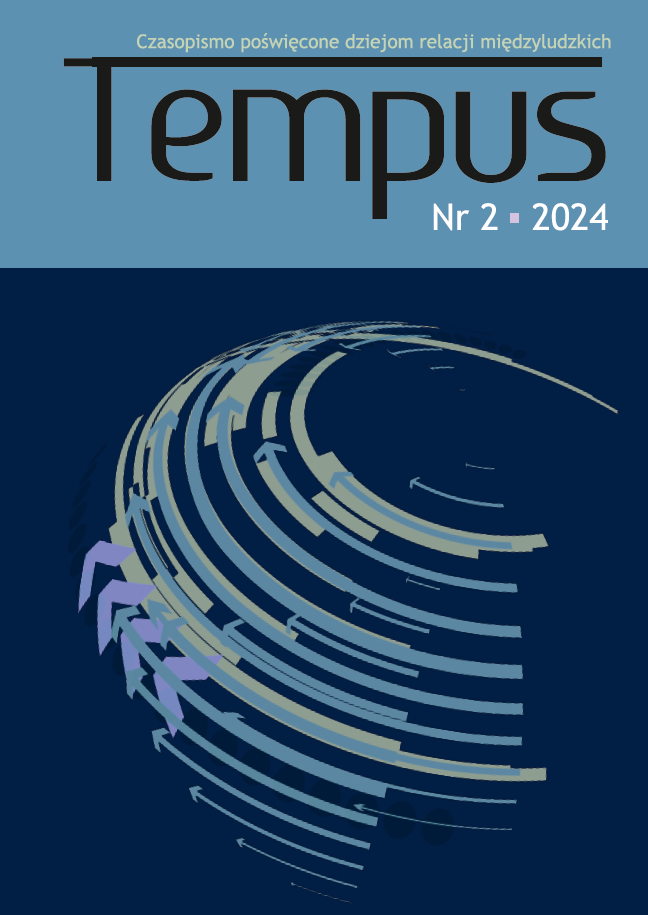Werbalne aspekty dzielenia się: szkic z praktyk oralnych
DOI:
https://doi.org/10.34739/tem.2024.02.03Słowa kluczowe:
dzielenie się, nieproszone dawanie, żądanie podziału, dyskurs narzekańAbstrakt
Celem opracowania jest omówienie praktyk werbalnych stanowiących integralną część zjawiska dzielenia się w społeczeństwach nomadycznych łowców-zbieraczy. Odwołując się do (funkcjonującego w literaturze antropologicznej) rozróżnienia dwóch trybó w dzielenia się (dzielenie się na żądanie i dawanie bez żądania), autor wskazuje, że pod uwagę trzeba też brać różnice między strategiami komunikacyjnymi poszczególnych społeczności (nastawionymi na ograniczoną konfrontację albo jej unikanie). Omawia ich funkcjonowanie w kontekście praktyk podtrzymywania gotowości do dzielenia się, „ochładzania serc”, formułowania roszczeń i odmawiania ich spełniania.
Pobrania
Bibliografia
Altman J., A genealogy of ‘demand sharing’: From pure anthropology to public Policy, [w:] Y. Musharbash, M. Barber (eds.), Ethnography and the production of anthropological knowledge: Essays in honour of Nicolas Peterson; Canberra 2011.
Benz M., The principle of sharing – an introduction, [w:] M. Benz (ed.) The Principle of Sharing. Segregation and Construction of Social Identities at the Transition from Foraging to Farming. Studies in Early Near Eastern Production Subsistence, and Environment 14, Berlin 2010.
Boehm Ch., Hierarchy in the Forest. The Evolution of Egalitarian Behavior, Cambridge – London 2001.
Boehm Ch., Moral Origins: The Evolution of Virtue, Altruism and Shame, New York 2012.
Bowles S., Gintis H., A Cooperative Species. Human Reciprocity and its Evolution, Princeton – Oxford 2011.
Briggs J.L., Conflict Management in a Modern Inuit Community, [w:] P.P. Schweitzer et al. (eds.) Hunters & Gatherers in the Modern World: Conflict, Resistance, and Self-Determination, New York 2000.
Draper P., The Learning Environment for Aggression and AntiSocial Behavior Among the !Kung, [w:] A. Montagu (ed.), Learning Non-Aggression: The Experience of Non-Literate Societies, New York 1978.
Endicott K., Property, power and conflict among the Batek of Malaysia, [w:] T. Ingold et al. (eds.) Hunters and Gatherers. Volume 2: Property, Power and Ideology, Oxford, New York 1988.
Gomes A., Give or Take: A comparative analysis of demand sharing among the Menraq and Semai of Malaysia, [w:] Y. Musharbash, M. Barber (eds.), Ethnography and the production of anthropological knowledge: Essays in honour of Nicolas Peterson; Canberra 2011.
Gregor T., Robarchek C.A., Two Paths to Peace: Semai and Mehinaku Nonviolence, [w:] T. Gregor (ed.), Natural History of Peace, Nashville–London 1996.
Gregory C.A., Gifts and commodities, Chicago 2015.
Harris M., Life without Chiefs, [w:] J. Spradley, D.W. McCurdy (eds.) Conformity and con-flict: readings in cultural anthropology, Boston 2011.
Howell N., Life Histories of the Dobe !Kung Food, Fatness, and Well-being Over the Life Span, Berkeley 2010.
Kwok N., Owning Your People: Sustaining relatedness and identity in a South Coast Aboriginal community, [w:] Y. Musharbash M. Barber (eds.), Ethnography and the production of anthropological knowledge: Essays in honour of Nicolas Peterson; Canberra 2011.
Lee R.B., The Dobe Ju/’hoansi, Wadsworth Cengage Learning 2013.
Locke J.L., Rank and relationships in the evolution of spoken language, “Journal of the Royal Anthropological Institute” 2001, vol. 7, s. 37-50.
Lomas W., Conflict, Violence, and Conflict Resolution in Hunting and Gathering Societies, “Totem: The University of Western Ontario Journal of Anthropology” 2011, vol. 17, nr 1, s. 43-50.
Macdonald G., Economies and personhood: demand sharing among the Wiradjuri of New South Wales.[w:] G. Wentzel et al. (eds.), The Social Economy of Sharing: Resource Alloca-tion and Modern Hunter Gatherers, Osaka 2000.
Ossowska M., Socjologia moralności. Zarys zagadnień, Warszawa 1986.
Peterson N., Demand sharing: Reciprocity and the pressure for generosity among foragers, „American Anthropologist” 1993, vol. 95, nr 4, s. 860-874.
Peterson N., On the persistence of sharing: Personhood, asymmetrical reciprocity, and demand sharing in the Indigenous Australian domestic moral economy, „The Australian Journal of Anthropology” 2013, vol. 24, nr 2, s. 166-176.
Price J.A., Sharing: The integration of intimate economies, „Anthropologica” 1975, vol. 17, nr 1, s. 3-27.
Rosenberg H.G., Complaint Discourse: Aging and Caregiving Among the Ju/’hoansi, [w:] R.B. Lee, The Dobe Ju/’hoansi, Wadsworth Cengage Learning 2013.
Rueden Ch., The Roots and Fruits of Social Status in Small-Scale Human Societies, [w:] J.T. Cheng et al. (eds.), The Psychology of Social Status, New York 2014, s. 1-22, DOI 10.1007/978-1-4939-0867-7_9.
Saethre E., Demand Sharing, Nutrition and Warlpiri Health: The social and economic strategies of food choice, [w:] Y. Musharbash, M. Barber (eds.), Ethnography and the production of anthropological knowledge: Essays in honour of Nicolas Peterson, Canberra 2011.
Scalise Sugiyama M.S., The forager oral tradition and the evolution of prolonged juvenility, „Frontiers in Psychology” 2011, vol. 2, art. 133, s. 1-19.
Skaanes T., Sounds in the Night: Ritual Bells, Therianthropes and Eland Relations among the Hadza, [w:] C. Power et al. (eds.) Human Orginis: Contributions from Social Anthropology, New York – Osford 2017.
Turnbull C.M., Leśni ludzie, przełożyła H. Błaszkiewicz, Warszawa 1996.
Tymowski M., Organizacja społeczeństwa, [w:] S. Tabaczyński et al. (red.), Przeszłość społeczna: próba konceptualizacji, Poznań 2012.
Widlok T., Anthropology and the Economy of Sharing, London–New York 2017.
Wiessner P., Norm Enforcement among the Ju/'hoansi Bushmen. A Case of Strong Reciprocity?, “Human Nature” 2005, vol. 16, nr 2, s. 115-145.
Woodburn J., Egalitarian Societies, “Man. New Series” 1982, vol. 17, nr 3, s. 431-451.
Pobrania
Opublikowane
Numer
Dział
Licencja
Prawa autorskie (c) 2024 authors

Utwór dostępny jest na licencji Creative Commons Uznanie autorstwa – Użycie niekomercyjne 4.0 Międzynarodowe.




